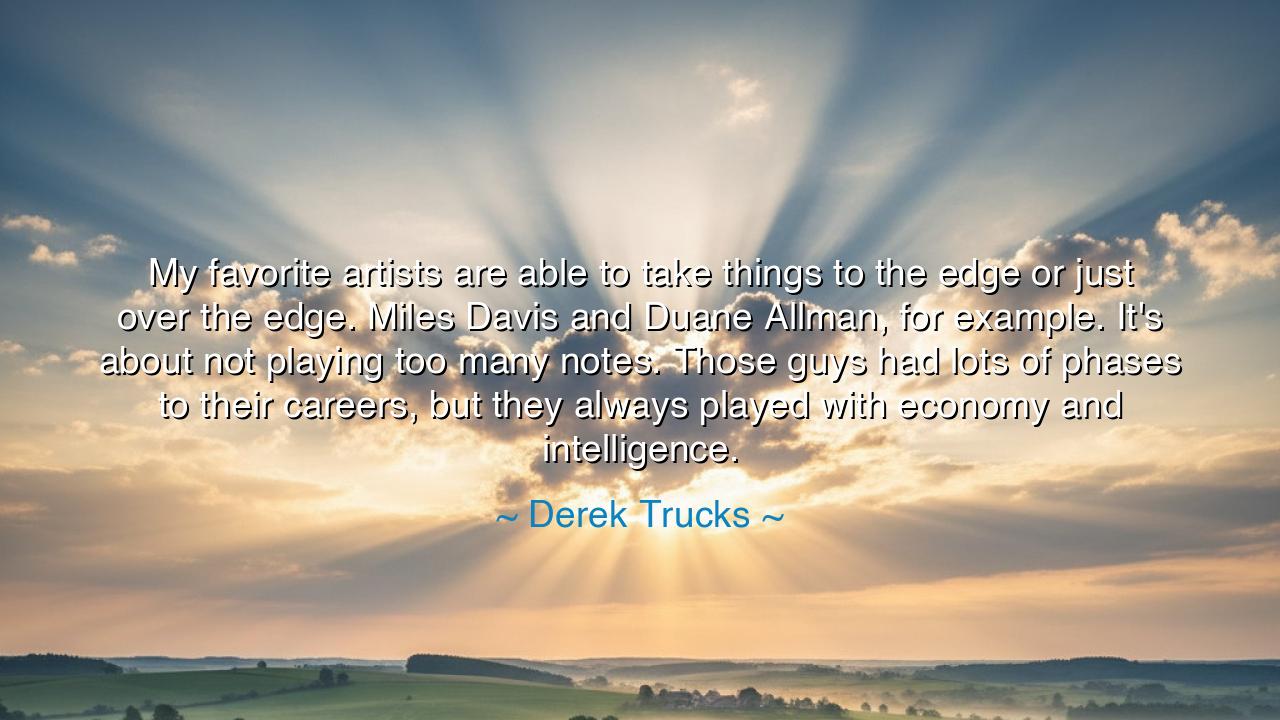
My favorite artists are able to take things to the edge or just
My favorite artists are able to take things to the edge or just over the edge. Miles Davis and Duane Allman, for example. It's about not playing too many notes. Those guys had lots of phases to their careers, but they always played with economy and intelligence.






In the insightful words of Derek Trucks, "My favorite artists are able to take things to the edge or just over the edge. Miles Davis and Duane Allman, for example. It's about not playing too many notes. Those guys had lots of phases to their careers, but they always played with economy and intelligence," we are invited to reflect on the delicate balance between innovation and restraint. Trucks, a master of the guitar himself, draws attention to the artistry of those who know that the most powerful music does not arise from sheer volume or complexity, but from the economy of expression—the careful and intentional choices that allow the music to breathe and resonate. In this statement, Trucks reveals a profound truth about the nature of art, not just in music, but in all forms of creation: that simplicity combined with depth is where true mastery lies.
The example of Miles Davis is particularly poignant. Davis, the legendary jazz trumpeter, was known for his ability to play with minimalism, using fewer notes to evoke far more emotion and meaning than many of his contemporaries who played with greater complexity. Davis’ ability to take things to the edge without overwhelming the listener was what set him apart. His music was a conversation, not a monologue. Davis understood that in jazz, as in life, less is often more—that to truly connect with the soul of the listener, one must leave space for the music to breathe, for the silence to speak as loudly as the notes. His genius lay not in how much he could play, but in how he could express emotion with the least amount of sound.
Similarly, Duane Allman, the revered guitarist of the Allman Brothers Band, exemplified the same philosophy. His guitar playing was often described as soulful, raw, and full of emotional depth, yet it was never excessive. Allman’s playing was a study in economy—each note purposeful, each phrase intentional, yet his music conveyed an overwhelming sense of urgency and passion. Allman’s ability to push musical boundaries without losing touch with the essence of melody and feeling mirrors the concept of the heroic artist in ancient tradition, where true mastery comes from the understanding that power does not lie in overwhelm, but in the precision of one’s craft. His work was the embodiment of restraint paired with intelligence, knowing when to push forward and when to pull back.
The notion of playing with economy and intelligence can also be seen in the ancient world of philosophy. Socrates, the great philosopher, often employed a method of inquiry known as the Socratic method, which was based on asking simple yet profound questions, leading his students to uncover truths through dialogue. Socrates didn’t burden his students with lengthy dissertations, but instead, used economy of words to provoke deep thought. His brilliance lay in his ability to cut through the noise of unnecessary detail and focus on the core ideas. Similarly, in art, it is often the ability to convey complex truths through simple gestures or minimalist techniques that makes the work resonate on a deeper level.
Consider also the story of Leonardo da Vinci, who, in his art and his scientific pursuits, exhibited the same restraint and depth. Da Vinci’s genius was not simply in the complexity of his designs or paintings, but in the clarity and precision of his vision. Whether it was the Vitruvian Man, a work that combined art and science, or his studies of human anatomy, da Vinci understood that true knowledge came not from overwhelming the senses with detail, but from distilling the essence of life into its simplest, most elegant form. This is the core of Trucks’ message: true mastery comes not from the excess of notes or ideas, but from knowing exactly what to say—and when to say it.
From Derek Trucks’ perspective, this principle holds equally true in music and in life. To take things to the edge, as he says, is not to push endlessly toward complexity or excess, but to find the sweet spot where restraint meets boldness. It is in these moments—whether in music, in art, or in our personal endeavors—that we find the truest expression of our abilities. Brilliance does not always lie in trying to do more, but in doing less, yet doing it with such mastery that it feels complete and profound. This is the art of economy—knowing when to hold back and when to release, creating space for the work, the message, or the music to breathe and resonate.
As we reflect on Trucks’ words, we are reminded that in our own lives, we too must strive for economy and intelligence in our pursuits. Whether we are artists, leaders, or simply individuals trying to navigate the complexities of the modern world, the key to mastery is not in how much we can do, but in how thoughtfully we engage with our craft. Let us embrace the wisdom of Miles Davis and Duane Allman—to take things to the edge, but with restraint, to express ourselves with economy, and to always be mindful of the power of silence and space in our work. In doing so, we will not only create with grace, but also with the depth and intelligence that will leave a lasting impact on the world around us.






AAdministratorAdministrator
Welcome, honored guests. Please leave a comment, we will respond soon